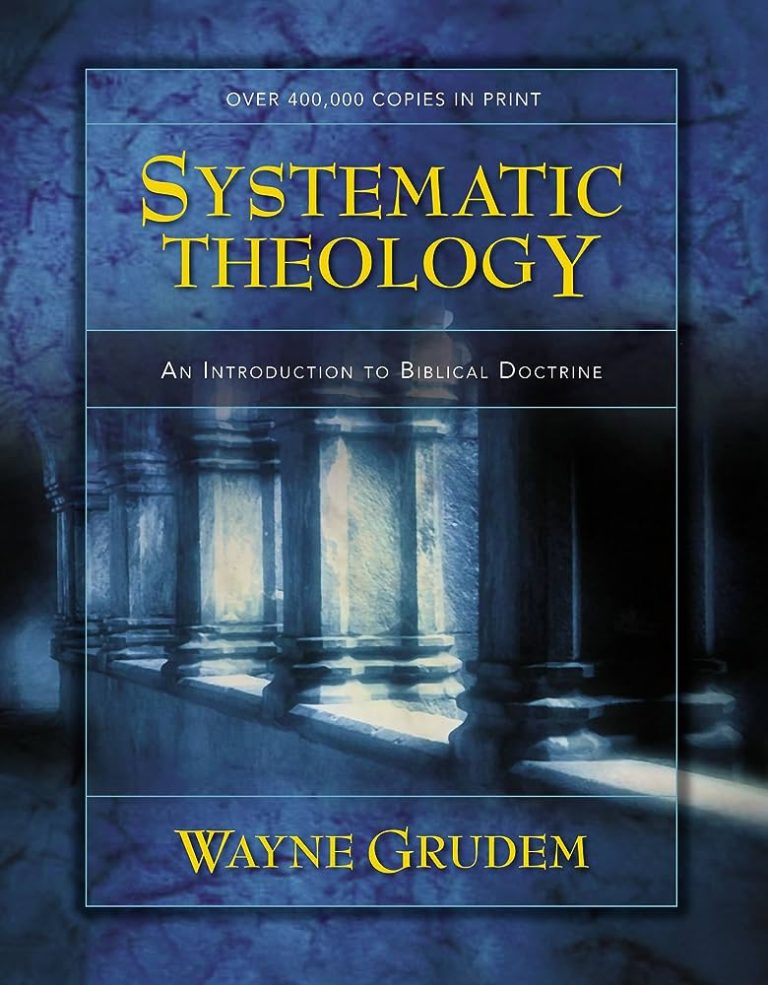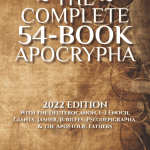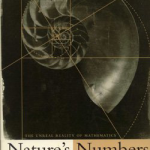“Systematic Theology: An Introduction to Biblical Doctrine” by Wayne Grudem is an excellent resource for any Christian who wants to understand the Bible’s teachings on theology. This book offers an in-depth and comprehensive look at the major doctrines of the Christian faith, as well as many minor ones. It covers topics such as God, creation, human nature, sin, salvation, angels and demons, the Church, and more. Grudem’s approach is both systematic and exegetical; he draws from scripture to explain each doctrine in a clear and precise manner. With his careful attention to detail, Grudem provides readers with an easy-to-follow guide to understanding complex theological topics.
The book includes helpful summaries at the end of each chapter that concisely summarize the main points covered in the chapter. There are also tables and charts throughout that help readers visualize and understand key concepts more easily. Additionally, there are numerous footnotes throughout that provide further information on pertinent topics or scriptures. Furthermore, Grudem includes a glossary of terms at the end of the book for quick reference.
Overall, this book is a great resource for those looking for a thorough introduction to biblical doctrine. Whether you are a new believer or have been studying Christianity for years, this book will provide you with an invaluable resource for your spiritual growth.
Systematic Theology: An Introduction to Biblical Doctrine Review

Systematic Theology: An Introduction to Biblical Doctrine is an comprehensive, easy-to-understand introduction to the study of God and His Word. Written by Wayne Grudem, one of today’s leading Christian thinkers, this book provides readers with a solid foundation in biblical doctrine and offers a thorough overview of basic theology.
Key Features:
1. Accessible introduction to major doctrines of the Bible
2. Clear writing style and logical organization
3. Comprehensive coverage of essential topics such as God, humanity, sin, Christ, salvation, the Holy Spirit, and more
4. Discussion questions for personal or group study
5. Includes charts and diagrams for easy reference
Systematic Theology: An Introduction to Biblical Doctrine provides readers with a straightforward look at the Bible’s teachings on God, human beings, sin and redemption. It offers a thorough exploration of the core beliefs of Christianity, from the Trinity to the Church, allowing readers to explore all facets of their faith. The book’s clear writing style and logical organization make it accessible to all who are interested in deepening their understanding of scripture. What’s more, each chapter includes discussion questions for personal or group study as well as charts and diagrams for easy reference. Whether you’re just starting out on your journey in faith or have been studying it for years, Systematic Theology: An Introduction to Biblical Doctrine will equip you with the knowledge you need to bring clarity and confidence to your walk with God.
Product Details
| Product | Description |
|---|---|
| Title | Systematic Theology: An Introduction to Biblical Doctrine |
| Author | Wayne Grudem |
| Edition | Updated Edition (2006) |
| Publisher | Zondervan Publishing House |
| Pages | 1218 pages |
| Language | English |
Systematic Theology: An Introduction to Biblical Doctrine Pros and Cons
Systematic Theology: An Introduction to Biblical Doctrine
Pros:
1. This comprehensive guide to Biblical doctrine is written by respected scholar Wayne Grudem, who has a strong background in systematic theology and biblical studies.
2. It is an easy-to-read volume that makes complex theological concepts understandable for the average reader.
3. It provides a thorough overview of all major topics in systematic theology and is ideal for classroom use or personal study.
4. It includes helpful charts, diagrams and maps to illustrate key points and provide visual aids for understanding difficult concepts.
5. The book is well-organized, making it easy to find specific topics quickly and easily so readers can access information quickly and efficiently.
Cons:
1. Some readers may find the language used too technical for their level of understanding.
2. The book does not provide in-depth analysis of some topics, which may leave readers wanting more detailed information on certain subjects.
3. It does not contain any discussion of the historical development of Christian doctrine or its impact on the modern world, which could be beneficial for some readers.
4. The book does not include any primary sources or direct quotations from scripture, which could be useful for further study and reflection.
5. The font size is quite small, making it difficult to read at times, especially for those with vision impairments or reading difficulties.
Who are They for
Systematic Theology: An Introduction to Biblical Doctrine by Wayne Grudem is an essential resource for any serious student of the Bible. This comprehensive work provides a thorough exploration of Christian theology from the perspective of biblical teaching, taking readers through all the major topics in systematic theology.
This insightful volume covers the attributes of God, human nature and sin, salvation and atonement, the church, the last things and more. Grudem’s clear prose and helpful summaries make this book an invaluable tool for theological students as they grapple with the complexities of Christian doctrine. He also includes helpful charts, diagrams and other study materials, making it an ideal textbook for classes on systematic theology.
Whether you are a pastor, professor or layperson, Systematic Theology will give you a better understanding of the foundational doctrines of Christianity and equip you to think more deeply about how these truths shape our lives. With this book, Grudem has provided an invaluable resource that will serve generations of theologians as they seek to grow in their knowledge and love of God’s Word.
My Experience for Systematic Theology: An Introduction to Biblical Doctrine

I’m a pastor, and I can’t live without my Systematic Theology: An Introduction to Biblical Doctrine textbook. You see, it’s the perfect companion for my Bible studies. It helps me dive deeply into the Word of God and understand its theological concepts in a systematic way.
It’s been with me since seminary, and I’ve used it countless times to answer difficult questions that come up during sermons. It’s great because it goes beyond just providing information. It offers insight on the text that I can use to better communicate with my congregation.
The explanations are written in plain language so that everyone can understand them. But at the same time, they’re full of depth and clarity. I can trust this book to provide reliable answers to difficult questions and help me easily explain Christian doctrines.
I know I’ll be using Systematic Theology: An Introduction to Biblical Doctrine for years to come!
What I don’t Like
1. Unclear organization: some readers have noted that the book can be difficult to follow due to its lack of clear organization and structure.
2. Too much detail: for those unfamiliar with Systematic Theology, this work may provide too many details and not enough overview or summary.
3. Difficulty of language: many readers find the writing style and language used in this book to be overly complex and difficult to understand.
4. Lack of visuals: this work does not include any diagrams, tables, or other visual aids that might help readers better understand the material presented.
How to Understand Biblical Doctrine Through Systematic Theology
Systematic Theology: An Introduction to Biblical Doctrine is a valuable resource for anyone looking to gain a better understanding of biblical doctrine. Written by Wayne Grudem, an acclaimed theologian and teacher, this book provides an in-depth introduction to the major doctrines of the Bible. It covers topics such as God, humanity, Jesus Christ, salvation, the Holy Spirit, the church, and more.
The book is written in a clear and accessible style that makes it easy for readers to understand. Each chapter begins with an outline of key facts, followed by Grudem’s detailed explanation of each doctrine. He also includes examples from Scripture and quotes from other theologians throughout the book. This makes it easy to apply the concepts discussed in each chapter to your own life and faith.
Grudem’s systematic theology is especially helpful because it gives readers an essential overview of all aspects of Christian doctrine. It helps you understand how individual doctrines relate to one another and how they form a cohesive whole. You can use this knowledge not only to strengthen your own beliefs but also to defend them against challenges from non-believers.
In addition to providing an overview of all aspects of Christian doctrine, Grudem’s systematic theology also offers practical advice on how to apply these teachings in everyday life. He explains how we should live according to God’s Word and shows us how our actions affect our spiritual walk with God. This makes Systematic Theology: An Introduction to Biblical Doctrine an invaluable resource for those seeking a deeper understanding of their faith.
Questions about Systematic Theology: An Introduction to Biblical Doctrine
What is Systematic Theology?
Systematic Theology is the study of God’s nature and character and how these attributes are revealed in the Bible. It seeks to understand what Scripture teaches about salvation, divine revelation, and other key elements of Christian belief. Systematic Theology: An Introduction to Biblical Doctrine provides readers with a comprehensive overview of this important discipline.
Who should read Systematic Theology: An Introduction to Biblical Doctrine?
Systematic Theology: An Introduction to Biblical Doctrine is an excellent resource for anyone interested in deepening their understanding of Christian beliefs. It is especially useful for pastors, theologians, and students seeking a comprehensive introduction to the fundamentals of systematic theology.
What topics are covered in Systematic Theology: An Introduction to Biblical Doctrine?
This book covers an array of topics related to systematic theology, including the Trinity, Christology, soteriology, pneumatology, ecclesiology, angelogy, anthropology, and eschatology. It also examines various contemporary issues such as hermeneutics and postmodernism.

Hi, my name is Lloyd and I'm a book enthusiast. I love to read all kinds of books, from classic literature to modern fantasy, as well as non-fiction works. I also enjoy writing reviews and giving my opinion on the books that I have read.


















